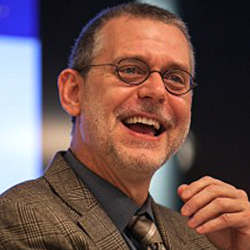Healthcare MBA Faculty Profiles
Get Program Details
This will only take a moment.
Step 1 of 2

Dr. James R. Bailey
Professor | Online Healthcare MBA Program
James R. Bailey is Professor and Hochberg Fellow of Leadership Development at the George Washington University School of Business, and a Fellow in the Centre for Management Development, London Business School. Dr. Bailey is the recipient of many teaching distinctions, including four GWSB Outstanding Faculty Awards. In 2006, he was named one of the world’s top ten executive educators by the International Council for Executive Leadership Development. He has published over 50 academic papers and case studies, and is the author of five books, including the award-winning, best-selling Organizational and Managerial Wisdom and the forthcoming Lessons on Leadership. Dr. Bailey is a frequent keynote speaker who has appeared on broadcast programs for the BBC, NPR, and Fox News Channel, and whose work has been cited in such outlets as the Wall Street Journal, Fortune, Forbes, and Business 2.0. He is a frequent contributor to The Hill, Washington Post, Washington Business Journal, and Harvard Business Review. He is the past Editor-in-Chief of the Academy of Management Learning and Education, as well as the founder and Editor-in-Chief of the online magazine Lessons on Leadership (www.lessonsonleadership.org.) Professor Bailey has served as a dean, department chair, and program director during his 25 year academic career.
Tell us about yourself and your role at the George Washington University.
I grew up in a family of educators so becoming and educator was perfectly natural. I don't have a job or a career. Being a professor is a calling, one I answered early and have never varied from. I'm very blessed and daily thankful for my livelihood. It's challenging yet self-directed.
With 25 years under the belt, I see myself as a bit of an "elder statesman"? It's so satisfying to be part of the development of young professors' success through improving teaching skill. I love the classroom but find out of classroom interactions--things like career direction, work-life balance, dealing with genuine leadership challenges--to have the enduring impact.
What key research and / or publications are you currently working on?
My writing has leaned heavily toward the practitioner world the last decade or so. Publications that reach active leaders like Harvard Business Review, the Washington Post or Business Expansion Journal are better suited to what I have, and want, to say. Recent articles have argued that good and great are not part of a leadership continuum - that failure is more important for success and that business is not as important as management.
What courses do you currently teach?
They all fall under a "leadership" umbrella. The graduate level Negotiations course is the bread and butter. I also teach all the Executive MBA leadership courses. The Healthcare MBA is the first core-course I've taught in a decade.
Well, the courses I teach are very applicable to healthcare in a couple of ways. One is that decisions have to be made in healthcare, whether they are policy decisions or treatment decisions. And the other course deals mainly with statistics. And professionals are always being learning new information that has statistical backgrounds. And a lot of times they don’t understand what these results mean and they have difficulty interpreting them.
What makes the GW Healthcare MBA online program unique?
The platform is wonderfully produced, with deep resource access but allowing for a personal touch. Core courses have a mix of Healthcare MBA and general MBA students which is a real benefit. In these courses, the mix of students from different industries and professional stages is a genuine benefit for all involved.
What surprised you the most about online learning?
I conducted my first online course in 2015. The student engagement far exceeded my expectations. Students were not only quick to respond to, say, discussion questions, but quick to reply to fellow student posts. Live Sessions were, well, lively.
It also expanded my notion of learning. I've been a "sage on the stage" professor for 25 years. To do online well, I had to check that instinct, give up control, and create assignments that were shepherded more by students than me. It was eye-opening.
I'm genuinely impressed by the quality of work and mastery of material displayed by online students. Online students are in every way, shape, and form, as good as the bricks and mortar ones.
How can this program help healthcare professionals be successful?
I do a lot of research in the legal industry. Lawyers think they're there for the law. True, to be sure. But it's a business too. The same thing holds for the healthcare industry. Health also has business components. To do it right, the business side must be right. To do health better, the business side must be excellent. This program is designed to make the quality of healthcare better by doing better business. And from my perspective, making healthcare professionals better leaders.
